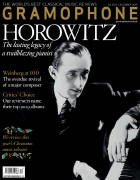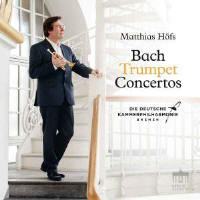Texte paru dans: / Appeared in: |
|
|
Outil de traduction (Très approximatif) |
|
|
Reviewer:
Jonathan Freeman-Attwood No modern-day piccolo trumpet soloist offers the security, delicacy and effortless élan of Matthias Höfs in 18th-century repertoire, as witnessed in his quirky Mozart chamber album from 2016 (Es-Dur) and now in this boldly entitled disc of Bach ‘trumpet concertos’. As with the great Maurice André’s various Bachian excursions, no apologies are given in pursuit of the art of transcription which was second nature to the composer – evinced here in three transcriptions of Venetian composers from Bach’s Weimar years and two others which exist only in adaptations he made for keyboard in Leipzig. Here Höfs resists the temptation of a compendium of movements (apart from the isolated first movement of the Italian Concerto), which allows one to listen with more ambitious ears as to the effectiveness of a complete reworked concerto. The G minor (BWV1056), often played by flautists, is a total delight in this regard, articulated with supreme control and good taste. Both the D major Concerto (BWV972), transcribed by Bach for solo keyboard from Vivaldi’s L’estro armonico, and the composer’s version of Marcello’s Oboe Concerto (BWV974), have become staples for trumpet recitalists in recent years. Höfs’s personal signature has long been famously impressed on the former with a DVD concert at St Thomas’s, Leipzig, recorded with German Brass back in 2009. If less beguilingly played here, the last movement has even more vim and ‘tempesta’, the quicksilver tonguing propelled by a thrillingly visceral bassoon continuo. André’s best concerto recordings were often illuminated by exceptional chamber orchestras, whether Jörg Faerber in Württemberg or Neville Marriner’s Academy of St Martin in the Fields, and the same is true here, with the trumpet sitting primus inter pares within the stylish playing of the Deutsche Kammerphilharmonie Bremen. The only difference is where Höfs resorts to the geometric at the expense of the poetic; how one longs for a broader tempo to carry the glorious curvature of the Adagio of the D minor Double Concerto (BWV1060). The trade-off for designer precision, homogeneity, elegance and evenness of tone is that there’s generally less scope for variety of colour, sound and character, or the kind of eye-watering beauty and spontaneity which ensure that André still remains nonpareil. Nevertheless, one cannot but deeply admire Matthias Höfs’s dazzling brilliance in these finely chiselled performances. |
|




